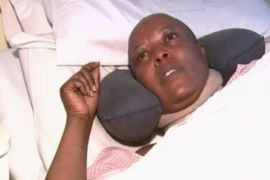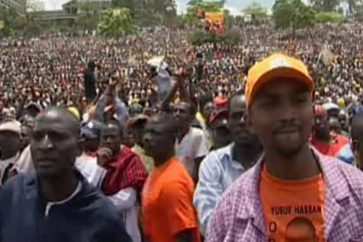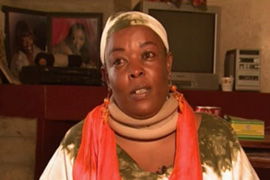The price of empowerment
Violence against women candidates during Kenya’s election campaigns is rising.

 |
| Some say Kenyan men have a problem with the idea of women being in charge and will do everything to frustrate her chances |
In the run-up to the Kenyan elections on December 27, Al Jazeera’s Everywoman programme looks at how violence against female candidates has reached an all-time high.
Political violence is nothing new in Kenya but the recent violence has been almost exclusively directed at women.
So far 255 cases of assault have been reported without a single arrest being made.
The case of Alice Onduto, who was shot outside her sister’s house earlier this month, is the most extreme example.
But Linet Miriti, the director of Unifem’s regional office in East Africa, explains that the attacks have taken varying forms.
“Many of the attacks that are targeted at women go beyond just physical attacks into sexual attacks and this is both physical and psychological,” she says.
“Lots of women are being attacked psychologically where they get text messages that degrade them sexually, where they get text messages that target their femininity and womanhood. And we’ve also had cases of physical sexual assaults against women.”
Torture incident
Flora Terra was beaten and tortured by five men outside her home in September in what she says was an attempt to stop her running for a parliamentary seat.
During the attack they attempted to choke her, then scored her wrists with thorns. They beat her with iron bars, dislodging a disc in her spine, and finished off the attack by shaving and tearing the hair from her head, mixing it with feces and forcing her to eat it.
 |
| It has been 25 years since a woman has even attempted to run in Flora Terra’s constituency |
She says that during the attack they repeatedly warned her against running in the elections.
Terra spoke to Yvonne Ndege, Al Jazeera’s East Africa correspondent, from her hospital bed shortly after the attack and told her: “The physical pain is not so much as the emotional pain. What I had to go through… it’s very painful emotionally. No human being should get that torture.”
More than two months later, Terra is back on the campaign trail having been approved by Kenya’s electoral commission as one of two candidates to compete in her constituency, Imenti North.
She is still wearing a neck brace and cannot walk without crutches.
She says: “It has been very hard. It was very hard the first month after my attack.
“I have been going through psycho-trauma therapy. That’s what has enabled me to come this far.
“The people who did this should have done an emotional audit first. Had they known what they were doing to me, they shouldn’t actually have done it because it has really given me a lot of courage. They have lifted up my spirits.”
‘Status-quo’
Terra’s supporters are confident she can win but her family is not so keen on her becoming an MP.
“For my son, he’s not being able to accept me being in politics. My mum too is always worried. Any time I go out on the campaign trail, if I don’t get home before four she’s so worried,” she says.
It has been 25 years since a woman has even tried to become an MP in Terra’s constituency.
Terra suggests civic education is the key to stopping the violence against Kenyan women who want to participate in politics.
She thinks that the majority of Kenyan men have a problem with the idea of a woman being in charge and will do anything to frustrate their chances.
Margaret Hutchinson from the Education Centre for Women in Democracy explains why this is so: “Kenya is strongly patriarchal and so the issues of leadership and decision making are normally endorsed by the men. So when women emerge to take up their rightful position in leadership and decision making, they are actually challenging the status quo and that is being resisted.”
‘Wilderness’
Of the 222 members of the current Kenyan parliament, only 18 are women.
That is the highest number in Kenyan history and Linet suggests that this has produced tremendous results.
She says: “For the first time we saw a sexual offences law passed through parliament and this was greatly supported by the women members of parliament.
 |
| Terra’s supporters are confident but her family worries for her safety |
“We also saw an attempt by the current minister of justice, who is a woman [Karua Martha Wangari], to introduce an affirmative action law in Kenya [an affirmative action bill was tabled and rejected in parliament in August.
“It was the third time that an affirmative action bill was rejected by the Kenyan parliament.”
Hutchinson argues that an affirmative action bill is a critical first step towards creating an environment in which women are not intimidated.
She says: “Parliament must pass the affirmative action bill because without an act of parliament, without the legal and policy framework in place we are going to be struggling in the wilderness and many will fall by the wayside.
“That will bring out the numbers, allow the women’s face to be seen in leadership and let them to be marketed to the wider population.
“In addition to that, we go to the communities and empower them to appreciate and promote women’s leadership.”